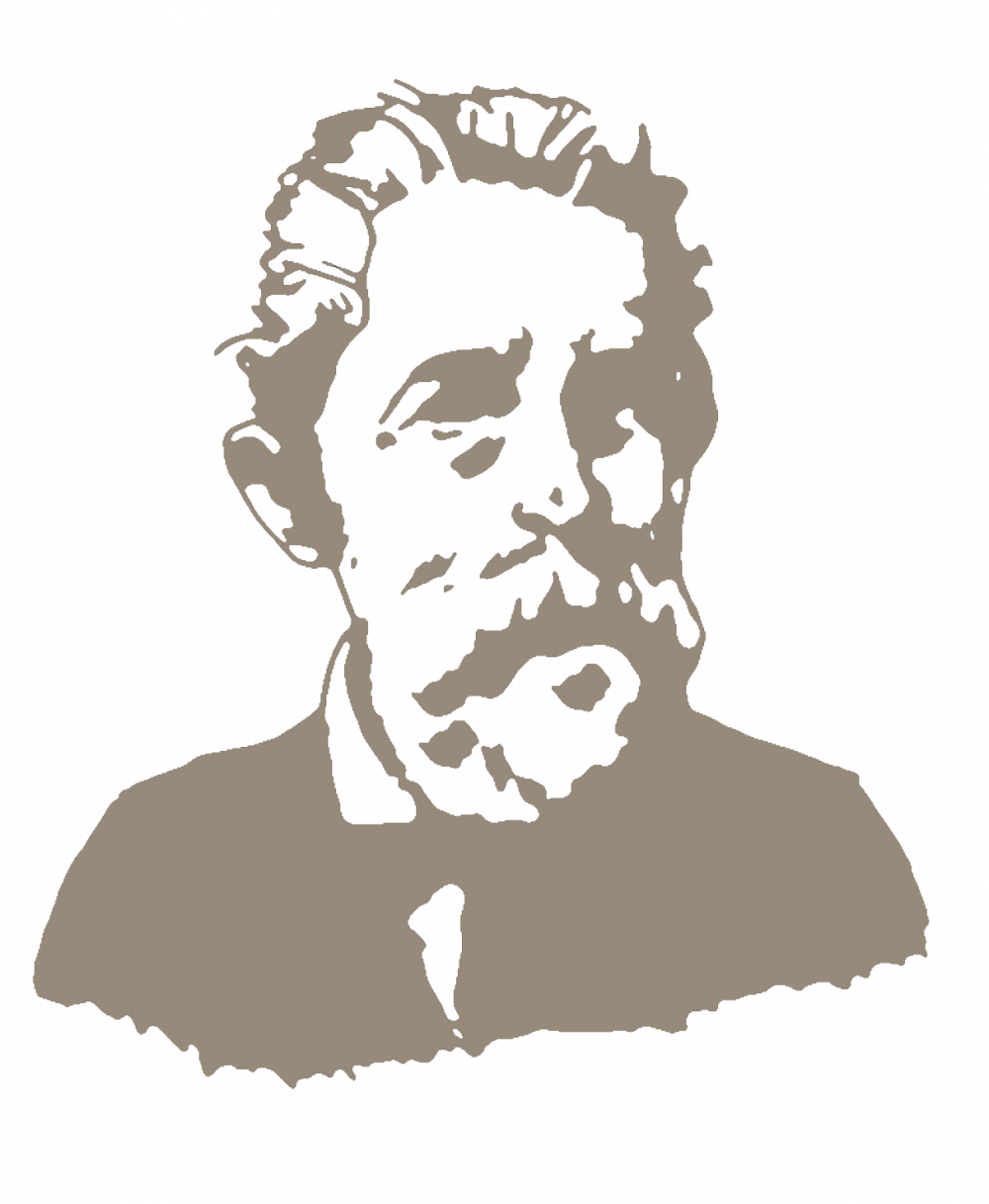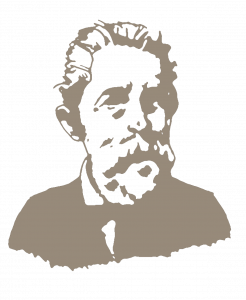by Andrea Bernardini
"Tuscany Today" 25 March 2012 - Pdf with additional contents
Two hundred steps separate the house of Giuseppe Toniolo from the church of San Martino in Kinseca where the professor stopped every morning to participate in the Eucharistic celebration.
A little more than a thousand from that church to the university where he immersed himself in passionate lessons in political economy. Giuseppe Toniolo taught political economics from 1879 to 1918, but also statistics, a discipline defined as "auxiliary", that is, an aid to the human sciences.
And he did so in the classrooms of the palace now called della Sapienza. This is evidenced by a plaque that we find at the bottom of the cloister of the building, next to the hall number "zero". It reads thus: "Giuseppe Toniolo, professor of this university from 1879 to 1918 in the investigation and meditation of history and economics with the fervor of a long loving teaching, sought and delighted in comforting harmonies in the Christian conception between science and life".
A fair tribute, which teachers and students, over the years, will also reserve for others. In fact, we find several tombstones and busts in the cloister of Sapienza. Dedicated to Antonio Pacinotti, the Pisan physicist inventor of the dynamo. Filippo Serafini "distinguished in the science of law" and for a year also rector of our university (a street that emerges from Palazzo della Sapienza and where the faculty of political science is located is dedicated to him). Gian Domenico Romagnosi, jurist, philosopher and physicist. Giuseppe Giusti, poet, like Giosué Carducci "disciple in this university". Finally Enrico Ferri «teacher in this university».
To better understand how Giuseppe Toniolo lived his "mission" at the university, we turned to Professor Marco Cini, 45, professor of Economic History at the Faculty of Political Sciences of our university.
Almost forty years of teaching, practically a lifetime. Giuseppe Toniolo's predecessors - Francesco Protonotari, Piero Torrigiani and Giaquinto Gioannis - weren't so lucky…
"It's true. The three professors he appointed, as well as their predecessors, gave lectures on political economy for a few years. The chair of economics was introduced in our university in the XNUMXs. But only Toniolo managed to give him a well-defined identity ».
In those years Giuseppe Toniolo was not the only teacher of political economy in Italy. But it is certainly the most original ...
“Toniolo actually carries out his teaching as a teacher and economist in a very particular phase. Between the end of the nineteenth century and the beginning of the following century, economic science in Italy experienced profound methodological changes, thanks to the affirmation of marginalist theories introduced by eminent economists such as Pantaleoni, Barone, Pareto. With the arrival of Toniolo in Pisa, the teaching of political economy undergoes a profound evolution and, it should be emphasized, it does not conform to the dominant scientific trends. It is known that Toniolo was the first Italian economist to expose and systematically apply the principles of the Christian ethical-social economic school which in other European countries - in particular Germany, Belgium and France - had already experienced an organic development. Coordinating economic reflection with the investigations of neo-scholastic philosophy, with the historical-sociological research of the modern Catholic school and the political currents of Christian democracy ».
How many students did you meet on your way?
«In those years the students enrolled in the Faculty of Law fluctuated around 400 units; a community traditionally very attentive and also lively. The teaching staff of the juridical college, on the other hand, did not exceed ten units ».
Will some of them return to the headlines in the following years?
“Unfortunately, Toniolo did not leave real heirs, at least not in the sense that we usually attribute to this word. In fact, there have been no prosecutors of his scientific research. However, this does not mean that his teaching and his scientific reflection were extinguished with his disappearance. Thanks to his Treatise on the social economy, the reflection of other Catholic scholars could benefit from the enormous research carried out by the Pisan professor on the logic of economic dynamics and on their interrelations with ethics. The Treaty was also adopted in numerous seminaries and Catholic schools ».
Where did his lessons take place?
«They took place in the halls of Sapienza. However, Toniolo was accustomed to continue his lessons also in the cloister of Sapienza, where he chatted with his students to deepen what was illustrated in class. Moreover, even in the obituary published in 1922 in the University Yearbook he insisted on his good relationship with the students, underlining that "he completed his perspicuous lessons with long interviews with his students, whom he did his utmost with cordiality and patience, with the sessions and discussions of the juridical-economic seminar ".
His house was open to groups of students who wanted to investigate certain issues with him ...
"Certainly, and in this too Toniolo continued a particular tradition of the University of Pisa, whose teachers were accustomed to opening their homes to students."
There are no traces of his student ratings. We know something, however, of the questions he asked his students ...
«The Domus Toniolo of Pisa keeps numerous questions prepared by Toniolo to verify the level of learning of the students. These documents also allow us to better understand how his courses were structured, their internal logic. The questions concerned the history of economic doctrines, the classification of economic systems, the relationships between the factors of production and monetary circulation. Great space was then reserved for the social crisis, socialist doctrines and the "current corrections of socialism" ».
We also have the text of many of his lectures. And this also allows us to understand how his idea of political economy matured. Reading those handouts we could also do without reading his treatise on social economy ...
«It is undoubtedly true that, at least in some respects, the didactic activity carried out by Toniolo can be considered as a very long preparation of the Social Economy Treaty. The Domus Toniolo preserves numerous lithographed handouts of the courses carried out by Toniolo over the years. Precisely these lecture notes allow us to retrace the complex itinerary undertaken by the Pisan teacher in maturing his interpretation of economic science, then entrusted to the Treaty ».
Toniolo was also dean of the law faculty of our university for some years. What relationships with your colleagues?
«Toniolo was dean of the Faculty of Law in the academic years 1884/85, 1896/97 and 1907/08. His relationship with colleagues was characterized by lights and shadows. While on the one hand he always maintained deep ties with some teachers, such as Carlo Francesco Gabba and Alessandro Corsi, on the other hand he often had to clash with some professors who - steeped in a very poorly enlightened liberal culture - misinterpreted his keen attention to the question social and for the working class, even accusing him of proximity to those subversive doctrines that Toniolo instead opposed, trying to offer a valid alternative. Undoubtedly Toniolo suffered a substantial isolation in the Faculty where he taught for many years, as well as remained on the sidelines from the economic debate that was taking place in the country, paying for his radical opposition to the dominant scientific addresses. We can legitimately comment on this condition as the inevitable price that men living in transitional periods are called to pay, who, with farsightedness and consistency, try to interpret them through original interpretations that are not flattened on the existing ».



